| Fairmont
park, Philadelphia, Pa
ENTS
Strikes Again!
|
dbhg-@comcast.net |
| Oct
04, 2003 16:21 PDT |
ENTS (and Dale in particular):
Will Blozan just called from Philadelphia, PA. He and his
brother searched Philadelphia's Fairmount Park for champion
trees today. Get a load of the numbers below!
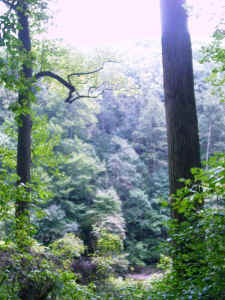
General canopy: The canopy is rugged and
weathered, offering very impressive and widely textured
vistas along the trail. Old-growth characteristics
are developing as the forest ages. Canopy gaps are
dominated in some areas by Devil's walking stick! -
photo by Will Blozan |
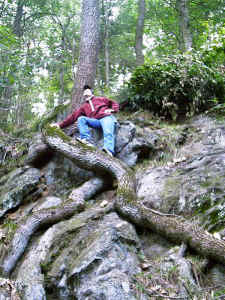
Chestnut oak roots: Nice character of the
knarled trees on exposed rocks. Some of these
chestnut oaks my be well over 200 years old. |
{Trip date October 4,2003}
Species
Height
Circumference
Tuliptree 158.6 10.9
Sycamore 139.0 11.4
White ash 135.7 7.3
N. Red oak 135.2 9.7
Bitternut Hickory 122.1 6.3
Black walnut 121.1 5.4
American beech 118.0
6.8
Sweet cherry 113.5 5.7
Hemlock
112.5
6.2
White oak 106.2 10.6
Rucker Index 126.2 8.0
Dale, Will covered a tiny part of the park. In time he sees the
index going up to 128 or 129, possibly 130. Pennsylvania's
state-wide Rucker Index has just been elevated. The tuliptree
becomes the tallest hardwood measured in the Northeast. We've
got some real contests going now.
Will will give a fuller account when he gets back home to Black
Mountain, NC. He will be out hunting again tomorrow. Who knows
what he'll find.
Bob
|
| RE:
ENTS Strikes Again! |
Dale
J. Luthringer |
| Oct
04, 2003 17:31 PDT |
HOOOOOOLLLLLYYYYY MOOOOOOOOOLLLLYYYY!!!!!!!!!
Way to go, Will! I don't mind editing the height lists when
they're in
PA! That's one dandy of a tuliptree! That tulip even tops our
recent
Zoar Valley tulip! The white ash, red oak, sycamore, black
walnut, and
bitternut are all new state records also!
Every time Will comes up here, he makes us re-write the record
books.
Great job, dude!
It's too bad I don't like to go to Philly, with places like
Fairmont
though, I might just have to make an exception.
How big is Fairmont Park? Is it in the city, suburbs, etc. I
think I
need some directions. I'm starting to feel the need to go
there...
Dale
|
| More
of the Fairmount Park... |
Will
Blozan |
|
Oct
07, 2003 21:18 PDT |
Well, Bob, actually....
The Rucker Index of Fairmount Park, Philly, PA, has gained ~2.25
points
after one more hour of searching on Sunday. My brother, Ben, and
I added a
134.2' bitternut, and a 116.7' black oak to the Rucker index,
which is now
128.44. There is not a doubt in my mind that a RI of 130 is a
given, and
will only stand for a few hours. Some of the new sites we found
have more
species in the 120's, which will knock out the lowest 4 species
in the RI.
Taller ash, white oak, sycamore, and hemlock (what's left- HWA
is BAD) and
beech will be found.
{Trip
Date October 6, 2003}
Here is a tally of the trees we measured, led off by the
tallest:
Tuliptree
10'11"158.6', I will send a photo to ENTS website, may be
160'-tough tree to
measure!
9'2" 155.1'
11'8" 153.9'
11'3" 153.2'
9'11" 148'
10'2" 146.3'
10'3" 143.2'
13'11"142.4', Not the biggest, we saw trees up to 15' last
year.
8'7" 140.3'
9'8" 137.6'
10'4" 135.5'
12'2" 133.4'
8'6" 128.8'
10'7" 132.3'
11' 130.73'
10'5" 129.9'
Beech
6'10" 118'
Bitternut
6'8" 134.2' 140' definitely possible.
7'8" 130.6'
6'5" 122.13'
White ash
7'4" 135.7' 140' almost certain, 120' trees are
"weeds".
8'8" 132'
10' 128'
10'6" 122.5'
Sycamore
11'5" 139' 140' certain, trees seen up to 16' from car-
return trip to
measure! (Dale?)
11'3" 130.2'
11'2" 125.9'
10'3" 119.9'
7'2" 117.8'
12'6" 110.8'
10'2" 108.7'
Hemlock
6'2" 112.5' 120' probably the max
7' 111.2'
6'10" 106.9'
Black walnut
5'5" 121.1' Perfect spot, young tree, should get to 130'+
9'9" 102' NICE forest-grown tree!!!
Sweet cherry (Prunus avium)
5'8" 113.5' Not native- but wish they were! GORGEOUS!
6' 110' Had three clear saw logs!
5'3" 102.5'
White oak
10'7" 106.2' Will find taller ones...
6' 91.9'
N. red oak
9'8" 135.24' May find taller ones...
10'1" 116'
Black oak
9'7" 116.7' Will find taller ones...
American basswood
6'3" and 100.2'.
This is just the surface, folks. The results above are from less
than 4
hours of on-trail, easy measuring. Do people in Philly realize
what they
have? I could stand on the trail used by thousands and shoot
straight up
with the rangefinder and register 48 yards on tuliptree (above
eye). That is
150' above ground!!! The average canopy has got to be near 130'-
and over
many, many acres. Miles and miles in fact. The above trees are
from a split
~2 mile section (less off-trail sections) of a four mile trail
which is but
a small portion of the park. As Dale would say HOOLLLLYYY
MMMMOOOLLLLEEEEYYYYYY!!!!
I suspect and expect the RI to exceed 132', perhaps more. As it
stands, I have measured in only a few dozen acres of a 8,900 acre park
(much of it is
open, though). And no white pine (yet)! Incidentally, I expect
that the final
RI will probably contain NO conifers. HOW ABOUT THAT!!!
Will
Photographs by Will Blozan,
Submitted Oct. 08, 2003 |
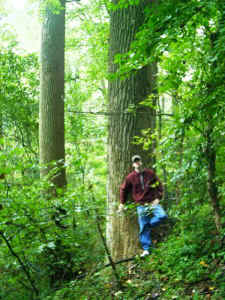
158.6' Tuliptree: My brother, Ben, at the base
of the tallest tree we found and tallest hardwood known
in PA. |
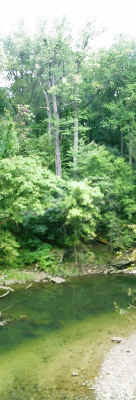
Tulip scene: A poor composite of the canopy
architecture of some big trees and the river below. The
chunky tree nearest the water is 153.2 feet tall and
11'3" in girth. |
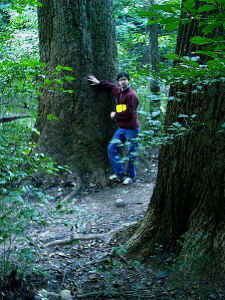
Tulip2: Photo of the base of some large trees.
Stocking is high across much of the walk we did,
allowing the tuliptrees to ascend to such great heights. |
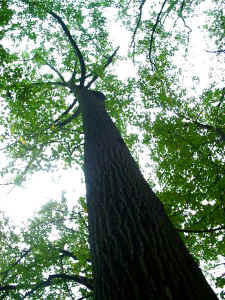
121' Black walnut: Very young tree with lots
of room, likely to reach 130'-135'. |
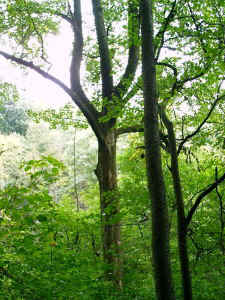
Tuliptree and sweet cherry: Although an exotic
invasive species, the sweet cherries were very
impressive and by far the tallest I have ever seen.
Preferring rich, deep soils, sweet cherries indicate the
richness of the site and represent a good chunk of the
Rucker Index. Balding of the tuliptree bark and canopy
architecture suggest ages of around 130-160 years. |

White oak: An unmeasured ~11' white oak that may surpass
120'. Ben and I were on our way out due to an extreme
calorie deficit and choose not to measure it. |
|
| Hooray
for Fairmount Park and Will |
Robert
Leverett |
| Oct
08, 2003 05:43 PDT |
Will:
<material deleted>
Given what you have seen, do you see the
Rucker Index reaching 134?
It sounds like it could happen, given all the terrain there is
left to
cover. And your observation about the center of northern red oak
development is a good one. The center of development certainly
won't be
in New England or comparable latitudes to the west and you've
sampled
its development in the southern Apps. But we need to await
further word
from Jess and Randy in S.C. and Michael who maybe can feed us
some N.
red oak data from eastern Tennessee before we conclude that 38
to 41
degrees latitude north is where Quercus rubra makes its best
stand (bad
pun, bad pun). Hey, this is ENTS at its best!
We need to figure out how to get some
publicity out of this one. We
could cast it as the showdown of the decade: eastern PA's tall
trees
versus those in the west - a real "tall-out". Cook
versus Fairmount!
Good press! After the leaves settled, we can have an ENTS parade
in
either downtown Philly or in Clarion. I have to admit, I'm still
prejudiced toward Cook, but I stand in awe of what you've
uncovered.
We'll have to figure out a time when comrade and Captain 4th
grade Lex
Luthringer can join us for a rendezvous in the city of brotherly
love.
Burl-belly (and darn proud of it) Bob over and out
|
| Re:
More of the Fairmount Park... |
Thomas
Diggins |
| Oct
08, 2003 08:40 PDT |
Will,
Sounds like you've stumbled on another Zoar Valley, albeit, a
bit more accessible and
visited. You're even finding killer forest-grown walnuts! What's
your take on the level
of human disturbance? Your tree sizes would likely indicate
old-growth in upstate NY,
but do other characteristics of the stand, and of the individual
trees, also suggest
this? I suspect southern PA probably can grow trees a little
faster than the Buffalo
environment, but this site sounds REALLY impressive by ANY
standards. Jolly good show!
Tom
|
| RE:
More of the Fairmount Park... |
Will
Blozan |
| Oct
08, 2003 09:38 PDT |
The site is certainly not old-growth, though trees over 200
years are
scattered about. The tuliptree/ash forests are probably 120-160
years, max.
LOTS of human disturbance and exotic species abound. Not a high
quality
ecological site but an intact forest of great dimensions. The
tulips ought
to go to 6' plus diameter with no problem, but will never be
"old-growth". I
think I saw some tulips in yards in the gorgeous suburb of
Chestnut Hill
that will likely be close to 18' and 130'.
To answer Bob's question, I suspect the RI may reach 134',
especially if
white pine enters the scene.
Will
|
| Re:
More of the Fairmount Park... |
Thomas
Diggins |
| Oct
08, 2003 11:01 PDT |
Will,
Yes, of course. Eastern PA has been settled for more than 300
years. We're quite
spoiled in Western New York to have a much shorter European
history - makes old
growth much more likely. Even Ohio has a longer disturbance
history (good rivers
and turnpikes, as opposed to the swampy routes west that led to
the Buffalo
area). Sounds like a forest that may develop into secondary old
growth, and
awesome at that. I noticed that your shade-tolerant trees are
mostly <7' cbh,
and no mention of sugar maple. Is this forest starting to
transition to
later-successional species? Sounds like an amazing site, even if
it's not
original forest cover. Way to go PA!
Tom
|
| RE:
More of the Fairmount Park... |
Will
Blozan |
| Oct
08, 2003 14:28 PDT |
I don't recall seeing any sugar maple. Norway (of course) and
red maple were
represented but not common. The sugars may be in the coves in a
more upland
position. I stayed down by the river along the road. Red maple
may reach
100' but the ones I saw were rather short.
Will
|
| Fairmount
Park Discovery |
Robert
Leverett |
| Oct
08, 2003 10:49 PDT |
ENTS:
Will's new discovery certainly befits the
president of ENTS and his
reputation deservedly grows with each new confirmation or climb.
Will asks an interesting question. He asks
whether the citizens of
Philly know what they have or not in the Fairmount forest and
the answer
is, of course, no. They would have no way of knowing and that is
where
ENTS comes in. Our fanatical dedication to accuracy is exactly
what was
needed to answer such questions. Otherwise each state, state
property,
federal property, private property becomes a little fiefdom unto
itself.
It happens that way. The managers of each property establish
their own
rules and the public trustingly accepts. Places like Fairmount
Park
become lost in time. Well, it just got rediscovered, or perhaps
just
discovered. When the park was first established, the tuliptrees
were
mere saplings - nothing to get excited about. Not so anymore.
Nor the
oak. Nor the sycamore. About all I can think of is Holy Moly!
Dale's
exclamatory phrase says it all.
Bob
|
| RE:
Cook Forest-Maple Dr. updates |
Will
Blozan |
| Feb
14, 2005 18:04 PST |
PA and NE folks,
Fairmount Park will without a doubt, be #2 in PA within a few
hours of a new
visit. I did not measure white pine which I saw over 125', and
taller
specimens of several species will be found. The question is
where to look.
Focus on the streams and deep coves, and look for species I have
not
measured yet. Hemlock must go higher (if you can find a living
one) as
should white oak. Green or white ash should hit 140' with
careful scouting.
Sycamore, if pressed in with tulips should go to the mid 140's
as well.
Contact Bill McKibben (sp) for sites, or my brother may know of
more places.
My brother just took me to a random place he thought was good,
and look what
I found! The park is HUGE!
Look out Cook Forest!
Will
|
|